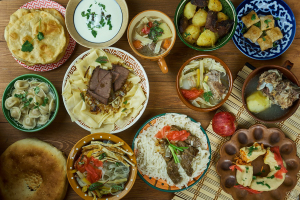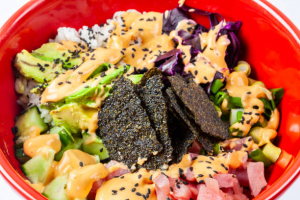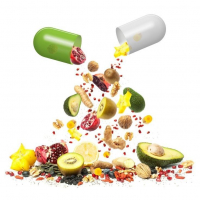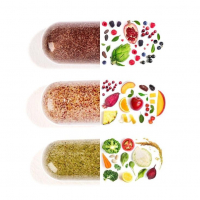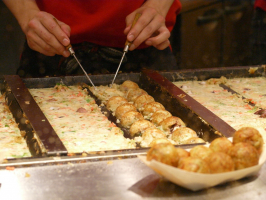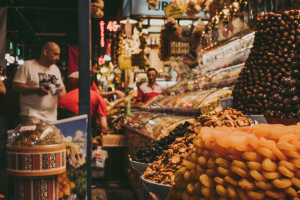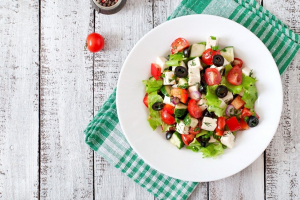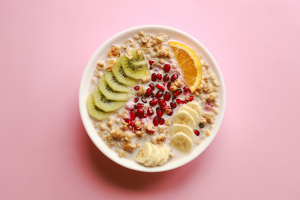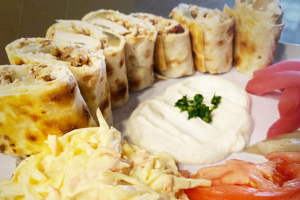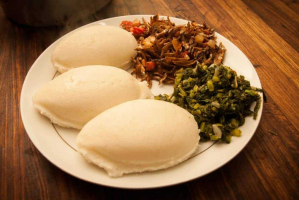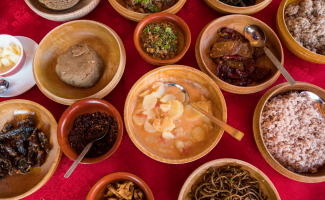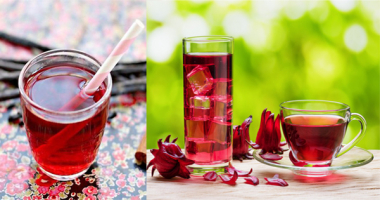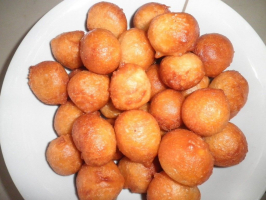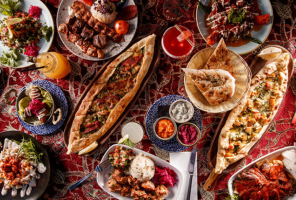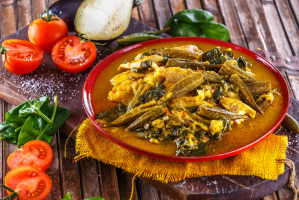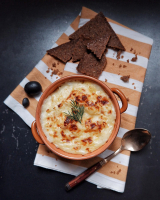Top 10 Best Egyptian Foods
Egypt has a long culinary history dating back to antiquity. It has a rich cuisine that gives Traveleaters in Cairo a lot to look forward to, especially those ... read more...who like vegetarian food. The pyramids are the country's most popular attraction, but traditional Egyptian dishes like Aish Baladi, Hummus, Baba Ghanoush and Ful Medames will keep you coming back for more. If you're planning a trip to Egypt and want to get a taste of the local cuisine, Toplist hopes the list of the Top 10 greatest Egyptian cuisines will point you in the right direction.
-
Bread is an essential ingredient in many cuisines. Its function is frequently dual: not only is it an important part of the meal itself, but it also frequently serves as a utensil or vessel in the consumption of food. This is true of Egyptian cuisine and aish baladi.
The Egyptian version of pita bread is aish baladi (or eish baladi). It's made entirely of whole wheat flour and baked at extremely high temperatures. In Cairo, it is baked several times a day and eaten at every meal, so you will never have to settle for stale bread in Egypt. This type of flatbread has been made since ancient Egypt. It was made with an ancient grain called emmer wheat back then. Wild yeast would aid in the rise of the dough, which would then be baked in traditional Egyptian clay ovens made from Nile River red mud.
Aish baladi has been a staple of Egyptian cuisine since antiquity. In fact, its name reveals how important it is to Egyptian culture. Aish means "life" and baladi means "traditional" or "authentic." It is consumed on a d
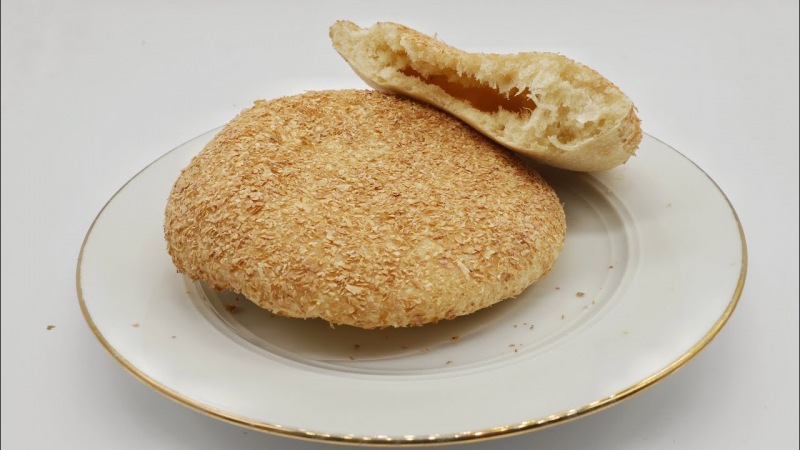
Photo: Fusion Food Blog's Youtube Channel 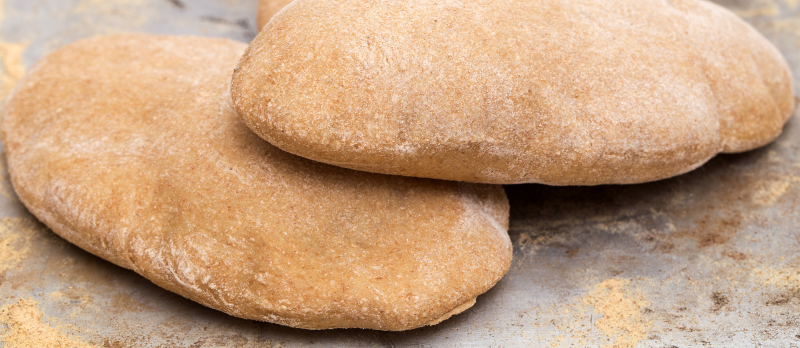
tasteatlas.com -
If you're looking for a tasty accompaniment to your aish baladi, look no further than hummus. It refers to a type of savory dip made from cooked mashed chickpeas blended with tahini, garlic, cumin, and lemon juice, which is popular throughout the Middle East.
Hummus is an Arabic word that means "chickpeas" and is a shortened version of the dish's full name, ummu bi ana, which means "chickpeas with tahini." The exact origins of the dish are unknown, but the earliest written recipes for a dish resembling hummus can be found in 13th century Cairo cookbooks. Hummus is typically served with pita bread and garnishes such as olive oil, whole chickpeas, paprika, and herbs as an appetizer or dip, or as an accompaniment to other Egyptian dishes such as falafel.
Interestingly, records show that Egyptians in the 13th and 14th centuries ate a version of the dish known as hummus kasa, which translates as "crushed hummus." It appears to be a chunkier, less blended version of hummus with coarsely chopped nuts added. You can get the recipe by clicking on the link.
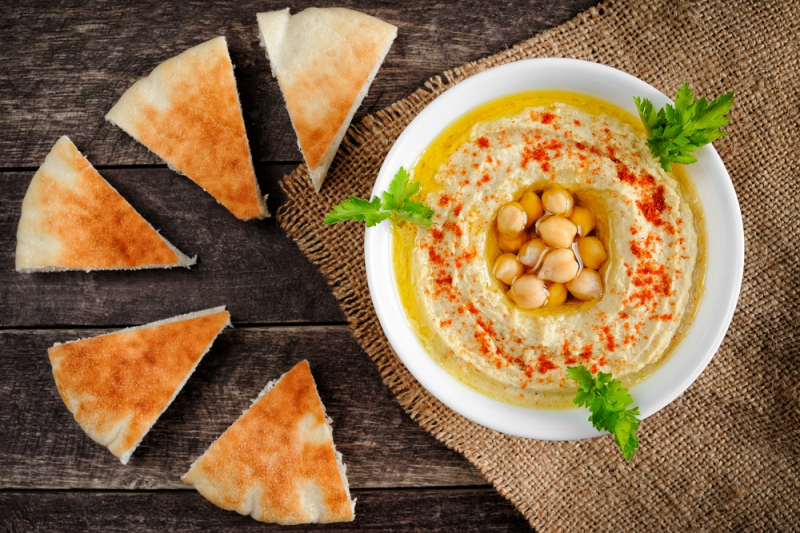
scoopempire.com 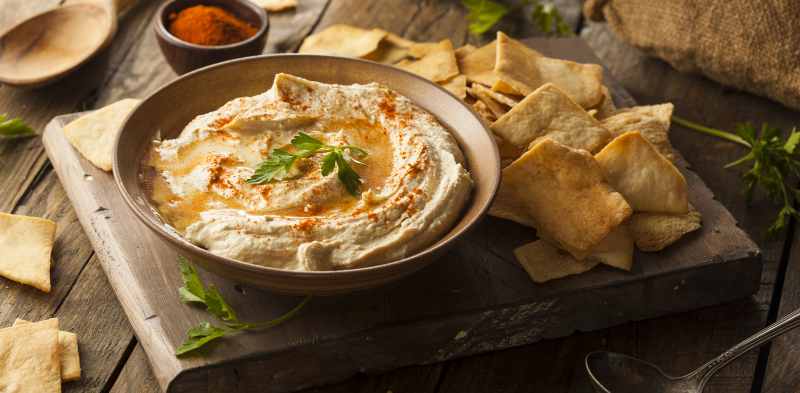
hearthandvine.comtasteatlas.com -
Baba ghanoush, also spelled baba ganoush or baba ghanouj, is a Levantine appetizer made of mashed cooked eggplant, olive oil, lemon juice, various seasonings, and sometimes tahini. It can be accompanied by onions, tomatoes, or other vegetables. Before peeling, the eggplant is traditionally baked or broiled over an open flame until the pulp is soft and smoky. It is a traditional meze of the region.
Baba ghanoush is a popular dip in Egyptian cuisine, similar to hummus. It's a traditional Lebanese dish made with mashed cooked eggplant, tahini, garlic, olive oil, lemon juice, herbs, and spices. Baba ghanoush is the deliciously smokey flavor that comes from roasted eggplant. It is prepared by boiling or roasting the eggplant over an open flame, then peeling and blending it with the remaining ingredients.
In Egypt, baba ghanoush is usually served cold, as part of a mezze platter with pita bread or as a side dish with larger meals.
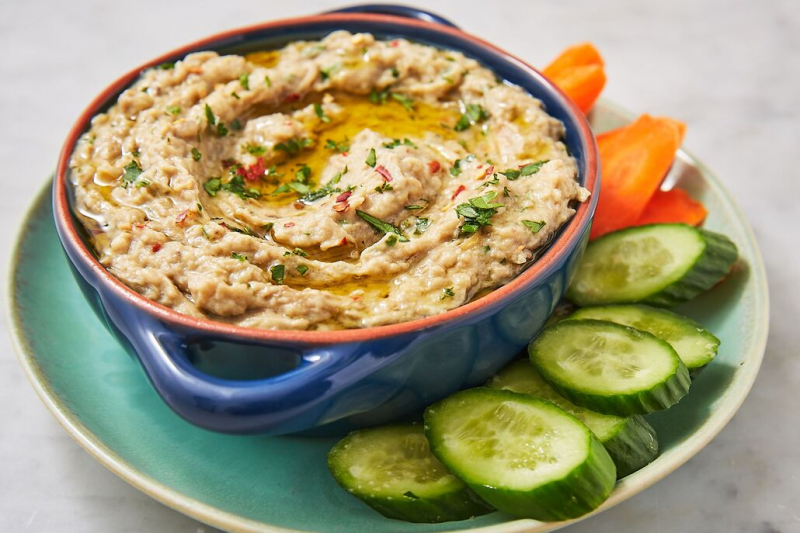
finmail.com 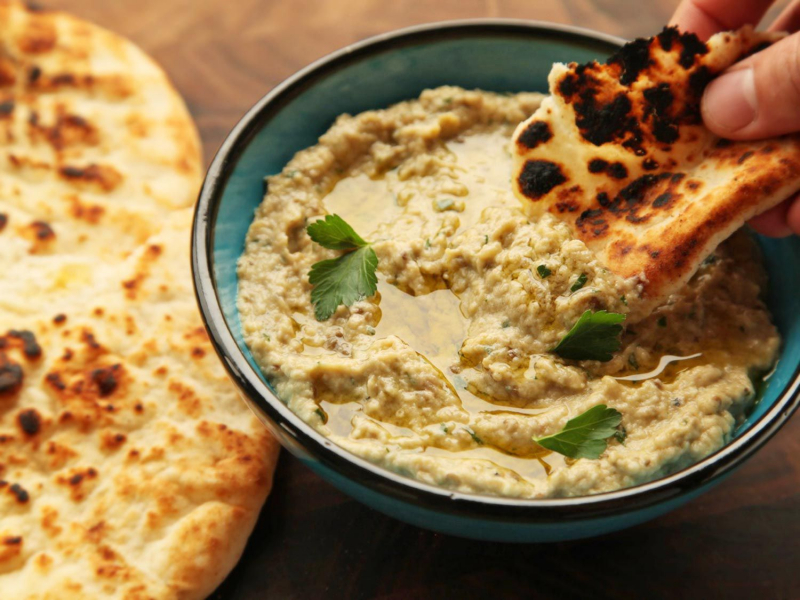
seriouseats.com -
Vegetarians in Egypt have a lot to look forward to, and Ful Medames may be one of the best yet. It is an Egyptian national dish consisting of a creamy fava bean stew cooked with cumin, olive oil, garlic, lemon juice, herbs, and spices.
Ful medames (or foul mudammas) is a traditional Egyptian dish, but it's also popular in the Middle East, the Levant, and North Africa. It's an everyday Egyptian dish that, like aish baladi, can be eaten at any time of day – for late breakfast, lunch, or even dinner. Ful medames, like hummus and baba ghanoush, is typically served as a dip with warm pita bread.
Ful medames is traditionally made with fl ammm or "bath beans," but it can also be made with other types of fava beans such as fl rm (European broad beans) and fl balad (country beans).
It's fascinating to learn that in the Middle Ages, people living near Cairo's Princess Baths, a public bath near Sultan al-Mosque, Muayyad's monopolized the cooking of fava beans for ful medames. During the day, bath attendants would light fires to heat enormous pots of bath water known as qidras. The fires would continue to burn after the bath closed at night, allowing them to simmer fava beans in the qidras and sell them the next morning.
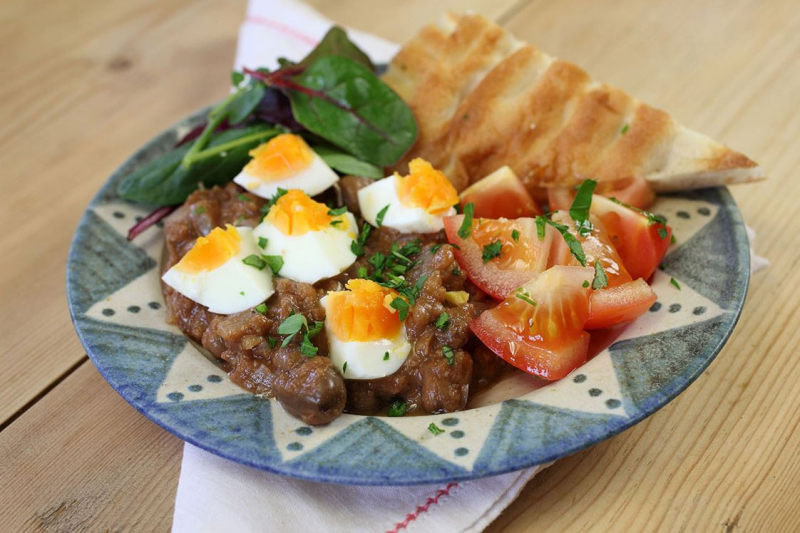
pulses.org 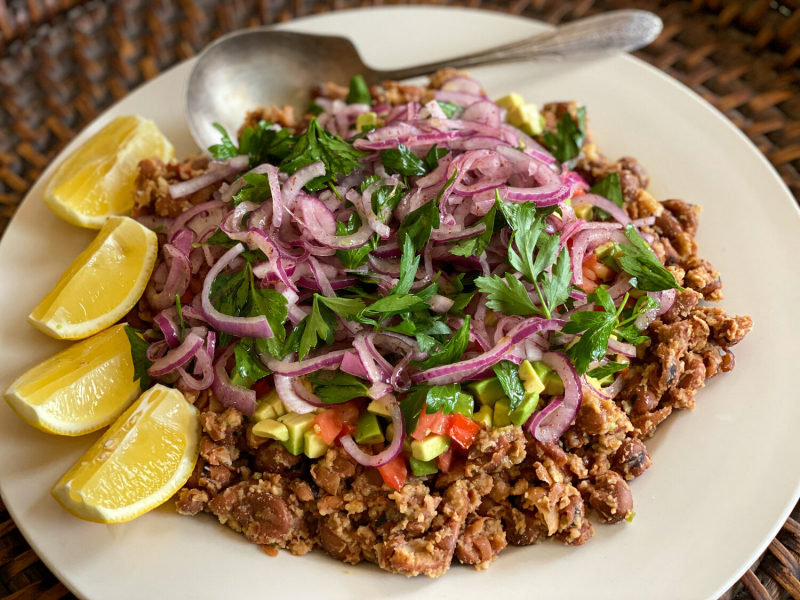
cookswithoutborders.com -
Another Egyptian national dish is koshari (or kushari, koshary). It's a popular Cairo and Egypt street food that consists of lentils, white rice, chickpeas, and macaroni topped with a spiced tomato sauce and crispy fried onions. Koshari is an Egyptian dish that dates back to the mid-nineteenth century.
Kosahri is yet another brilliant way to use up pantry staples. It is related to the Mujadara of the Middle East. In a nutshell, it's a hearty bowl of pantry staples: spiced lentils and rice with chickpeas and small pasta. All smothered in a tomato sauce spiked with vinegar (which, by the way, is out of this world delicious!) Then...wait for it...savory, crispy thin fried onion rings are piled on top.
Kosahri was originally sold from street carts in Egypt and was popular primarily among workers and laborers. It was later introduced to restaurants and has since become one of Egypt's most popular comfort foods.
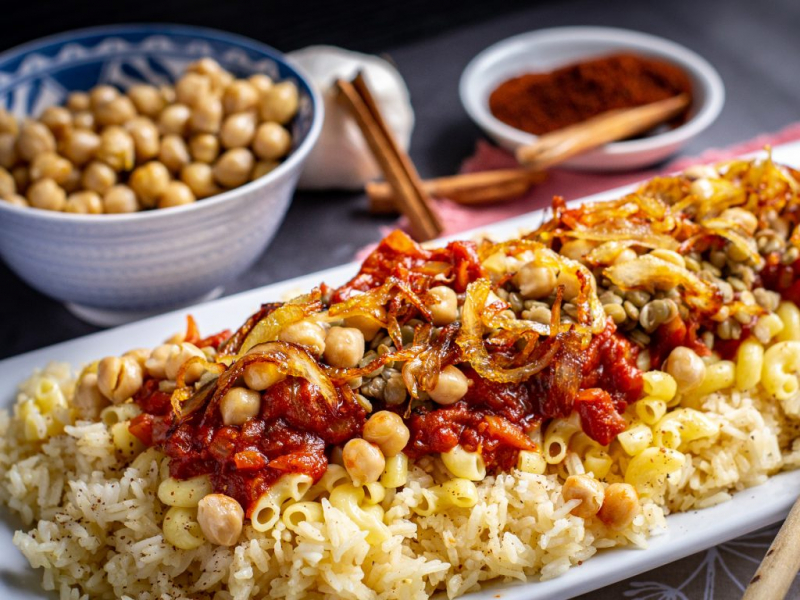
gradfood.com 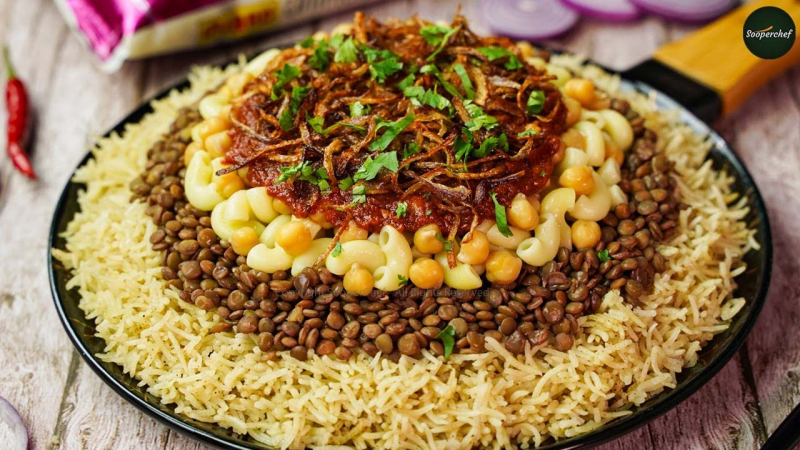
Photo: SooperChef's Youtube Channel -
Molokhia (or mulukhiyah, molokheyya) is an Egyptian soup as well as the leafy vegetable used to make it. It's a classic Egyptian comfort food, similar to ful medames and koshari, and is widely regarded as an Egyptian national dish.
Molokhia is made from the leaves of the Corchorus plant, also known as jute mallow, Jew's mallow, or nalta jute. It is used in the cuisines of many other countries, including Tunisia, Kenya, Haiti, and the Philippines, in addition to Egypt.
Finely chopped jute leaves are boiled in chicken broth with sautéed garlic, coriander, and seasonings to make Egyptian molokhia. Molokhia has a slimy viscosity when cooked, similar to okra. The soup is traditionally served with rice or Egyptian flatbread and is frequently paired with meat dishes such as roasted chicken, rabbit, or seafood.
Molokhia is a traditional Egyptian dish that many Egyptians grew up with. Many mothers, according to this Egyptian food blogger, use it to introduce new vegetables into their children's diets. Because most Egyptian children enjoy molokhia from an early age, mothers would hide finely chopped vegetables such as carrots, broccoli, peas, and beans in their mound of molokhia and rice.
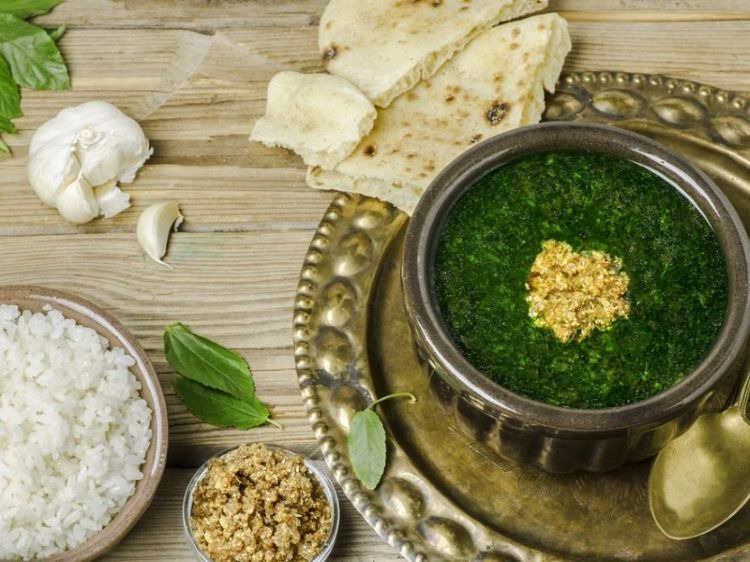
scoopempire.com 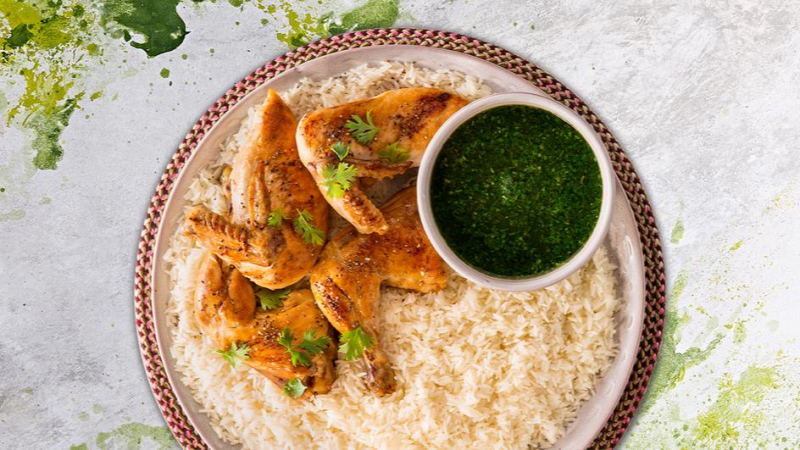
maggiarabia.com -
Shakshuka (or shakshouka) is one of the most well-known North African dishes around the world. It is popular in the Levant and Israel, but its origins are most likely in North Africa, most likely Tunisia. Shakshuka, an original Maghrebi dish, is made with poached eggs in a tomato sauce made with tomatoes, garlic, green pepper, bell peppers, onions, and olive oil. It's a flavorful one-skillet dish flavored with herbs and spices like parsley, mint, coriander, paprika, and cumin. Shakshuka is Arabic for "shaken together" or "mixed."
Shakshuka is traditionally eaten for breakfast or brunch, particularly in Israel, but it can be enjoyed at any time of day. It goes well with flatbread and salad and is frequently served as part of a larger mezze platter alongside hummus, falafel, and other traditional Egyptian dishes.
Shakshuka is traditionally a vegetarian dish, but it can also be made with ground beef or ground lamb. There's even a green version of the classic recipe that replaces tomatoes with leafy greens like spinach, kale, collard greens, and brussel sprouts.
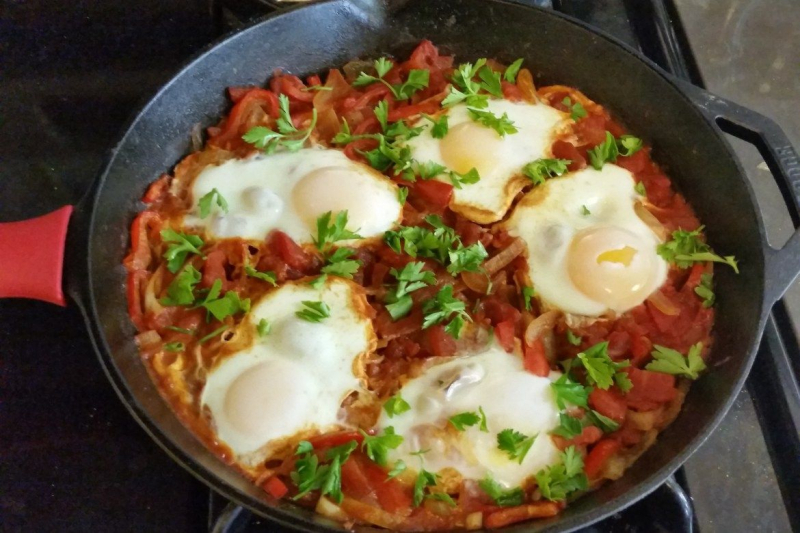
pinterest.com 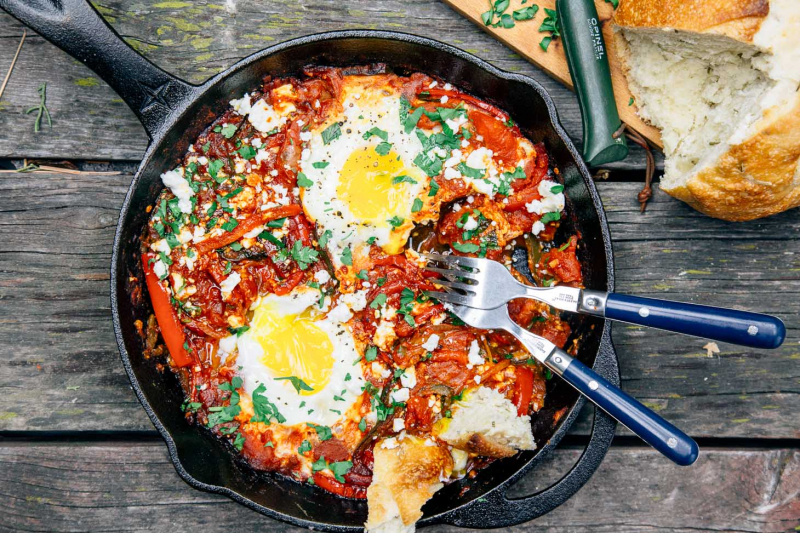
freshoffthegrid.com -
Without falafel (or ta'ameya), no Egyptian food guide would be complete. It's one of the most well-known traditional Egyptian dishes, along with koshari and ful medames. Fetafel is a popular street food in Cairo and throughout Egypt. It consists of deep-fried balls or discs made from ground fava beans, herbs, and spices. It's popular throughout the Levant, but it's thought to have originated in Egypt, where it's considered a national dish.
Falafel is thought to have been invented by Coptic Christians in Egypt who used it as a meat substitute during Lent. During Ramadan, it is sometimes consumed as part of the iftar meal, which breaks the daily fast after sunset. It's such a popular Egyptian breakfast item that you can order a McFalafel for breakfast at any McDonald's in Egypt.
The Egyptian version of falafel differs from the rest of the Middle East in that it is made with dried and ground fava beans rather than chickpeas. Egyptian falafel, in addition to being lighter and more humid, has a greener interior due to the use of more herbs. Many fans of the dish believe that this Egyptian version of falafel is still the best in the world.
Egyptian falafel, no matter how it's made, can be eaten on its own or as part of larger mezze platters. A favorite way to eat falafel is in a pita sandwich with tomatoes, onions, lettuce, and tahini sauce. Hot sauce is always a good addition.
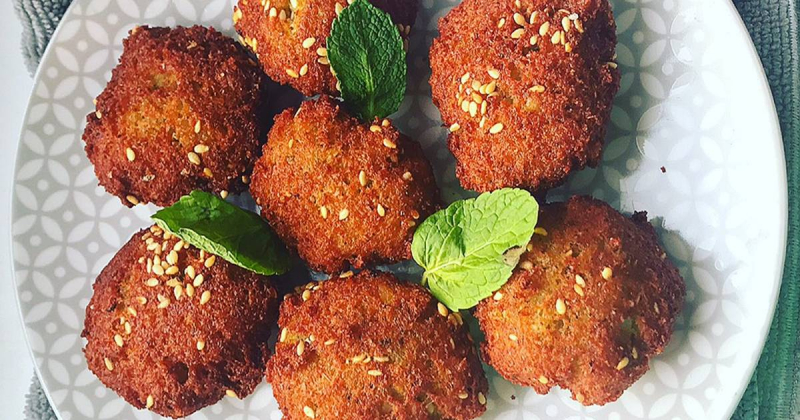
cookpad.com 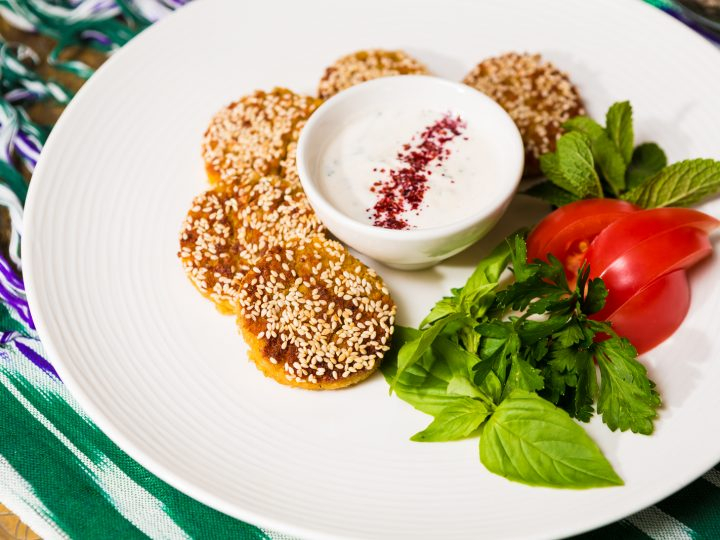
alittlenomad.com -
Kofta (or kefta) is a meatball or meatloaf dish that is popular in the Levant, North Africa, the Mediterranean, the Balkans, and the Indian subcontinent. They're typically made in Egypt with various types of seasoned ground meat, but they can also be made with other ingredients such as fish and vegetables. Kofta can be cooked in a variety of ways after being formed into balls, patties, or cigars.
Skewered and grilled koftas are kofta kebabs. Recipes vary, but they're typically made with ground beef and ground lamb, onions, garlic, and a variety of herbs and spices such as parsley, mint, sumac, nutmeg, cardamom, allspice, cumin, and paprika.
The meat mixture is shaped onto skewers and grilled for about four minutes on each side. When they're done, serve them with white rice or pita bread and your choice of sides, salads, and dips.
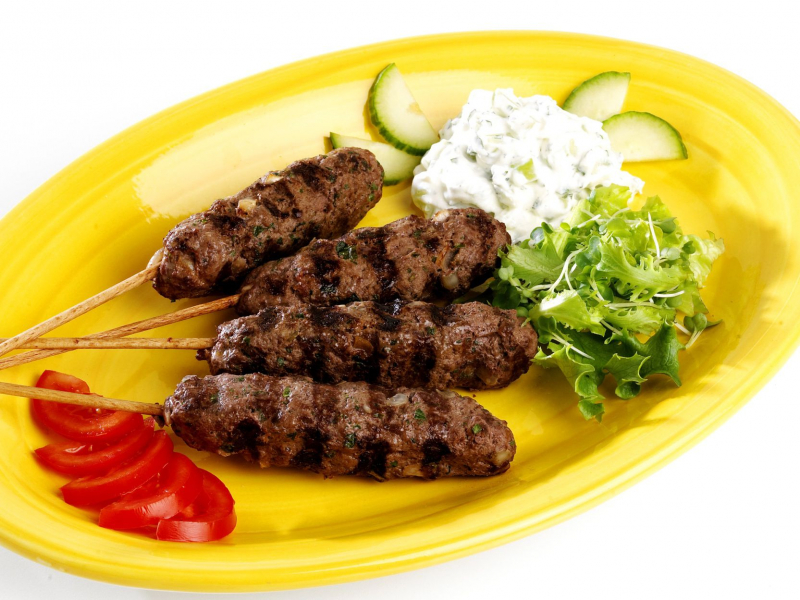
verywellfit.com 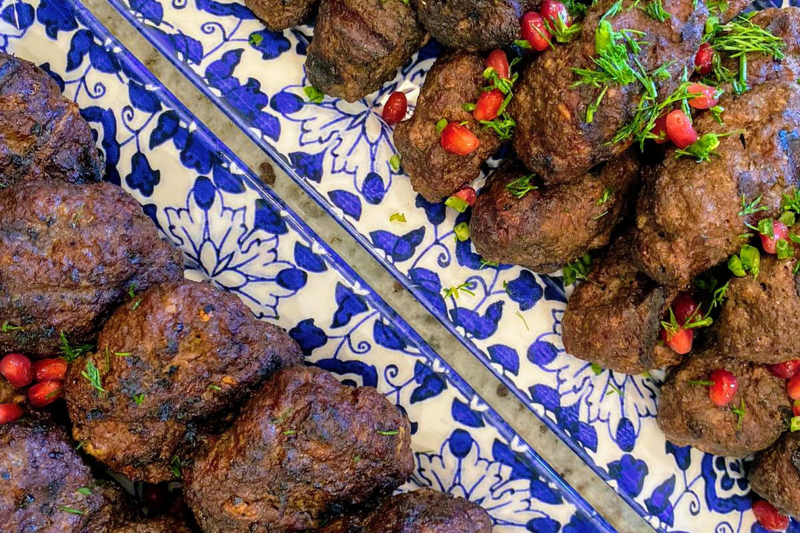
food52.com -
One of the favorite street foods is shawarma. It's a Levantine Arab dish that's extremely popular as street food in Cairo and across Egypt. It's popular throughout the Middle East and beyond, and it's even mentioned in an Avengers post-credit scene. Shawarma is made up of thinly sliced grilled meat sliced from a rotating vertical rotisserie. It's usually served as a pocket sandwich or wrapped in pita bread with onions, tomatoes, cucumbers, french fries, tahini sauce, and hot sauce.
Thin slices of heavily spiced meat – usually beef, chicken, lamb, or mutton – are pierced and stacked onto a vertical skewer to make shawarma. Larger pieces are layered on top to form a cone-shaped stack about 60 cm (20 in) high. The stack is then turned by a motorized spit against a vertical heating element to slowly roast the meat in its own juices and fat. It's delectable and a must-try in Egypt.
Gyros and shawarma are derived from the doner kebab, which first appeared in Ottoman Empire kitchens in the 19th century. In the early twentieth century, Lebanese immigrants brought shawarma to Mexico, where it evolved into tacos al pastor.
It's always interesting to trace the origins of a dish and see how it evolved to suit the local palate, just like the various iterations of pizza.
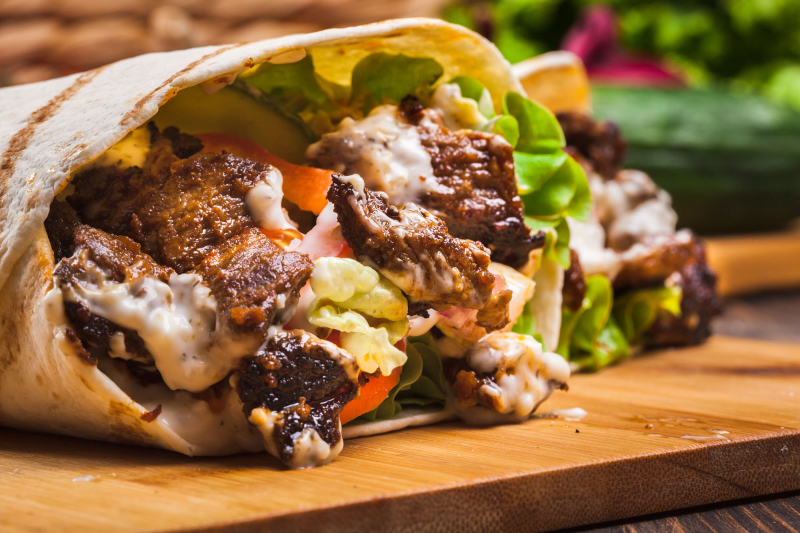
desidakaar.com 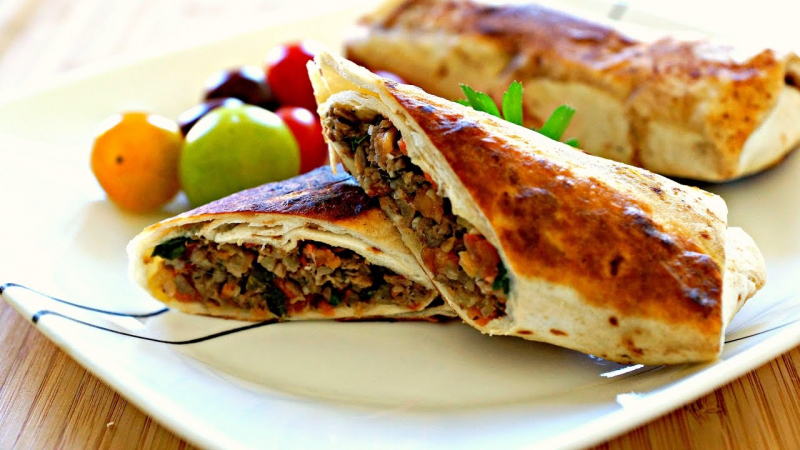
Photo: Miriam's Kitchen's Youtube Channel













